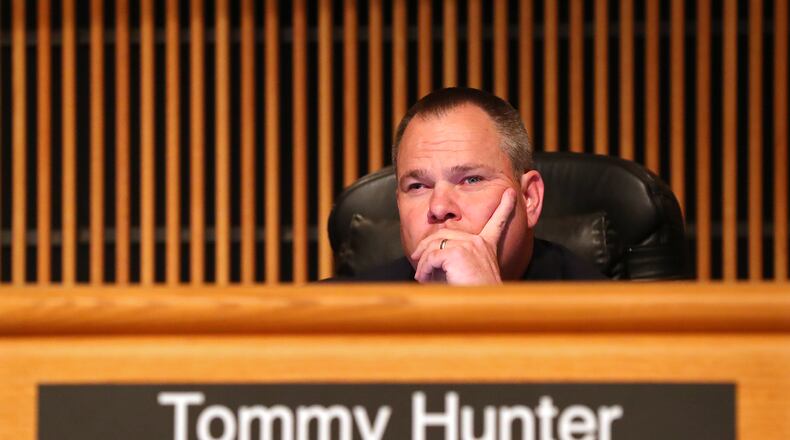Embattled Gwinnett County Commissioner Tommy Hunter has not made his appointment to the ethics board tasked with investigating his own controversial social media activity — and it’s unclear if he’ll make one at all.
But Commission Chairman Charlotte Nash believes it may not matter. Asked Tuesday if the ethics board could move forward with its work even if Hunter opts not to make his appointment — the fifth and final one needed to complete the panel — she said yes.
“Four people have [been] seated, that's a majority of the board,” Nash said. “My anticipation is that it would proceed unless there's some type of court challenge.”
Local attorneys Helen Kim Ho and Christine Koehler filed the ethics complaint against Hunter on Feb. 6. Filed on behalf of Atlanta resident Nancie Turner, it alleges that, with Facebook posts like the now infamous one calling U.S. Rep. John Lewis a "racist pig," Hunter violated several sections of Gwinnett's 2011 ethics ordinance.
The ordinance is primarily meant to target shady land deals and other corruption, but one section highlighted in the complaint against Hunter urges elected officials and county employees to “never engage in conduct which is unbecoming to a member or which constitutes a breach of public trust.”
MORE: Photos: 13 controversial Facebook posts from Gwinnett Commissioner Tommy Hunter
MORE: Timeline: Aftermath of Tommy Hunter's 'racist pig' Facebook post
MORE: Meet Seth Weathers, the brash consultant battling 'racist pig' backlash
MORE: Black Caucus keeps heat on after 'racist pig' post
MORE: After 'racist pig' post, a new Gwinnett normal: disruption and disorder
Under the ordinance, the ethics board that investigates complaints is not a standing body and must be assembled each time a complaint is filed. Five parties — including the subject of the complaint — are given the power to make appointments. The appointments are to be made within 30 days of the involved parties being notified of the need to do so, “or as soon thereafter as practicable.”
The 30-day mark passed on Sunday and, as of Tuesday evening, all parties but Hunter had made their selections.
Seth Weathers, a political consultant who has acted as Hunter's spokesman since his Jan. 14 Facebook post about Lewis, has not responded to multiple inquiries about the commissioner's ethics board appointment.
He has previously called the formulation of Gwinnett's ethics board "entirely unconstitutional," questioning the use of appointments made by non-elected officials.
That aspect of ethics boards is currently being adjudicated in a separate case in DeKalb County, where former Commissioner Sharon Barnes Sutton has now filed two separate lawsuits. In her original lawsuit from 2015, which has not yet been resolved, Barnes Sutton argued that DeKalb's ethics board was illegally formed because it used private organizations to make appointments.
It’s not believed that Hunter has filed any legal action against Gwinnett or its ethics board. But if he does, the outcome Barnes Sutton’s suit would likely play a large role in its success or failure.
Hunter’s appointment to the board is all that’s required to round out a panel that has accrued its other four members in recent weeks.
Herman Pennamon, a longtime community leader and volunteer, was appointed by the Board of Commissioners; David Will, a longtime Lawrenceville attorney, was appointed by the Gwinnett Bar Association; current Gwinnett grand juror Terri Duncan was appointed by the Gwinnett County District Attorney's Office; and Fayette County Commissioner Charles Rousseau was appointed by the Association of County Commissioners of Georgia.
Given that the ordinance leaves the door open for appointments to be made “as soon thereafter [the 30-day period] as practicable,” it’s unclear when the decision to move forward without a Hunter appointment would be made.
But Nash reiterated that, absent a legal challenge, she believes Hunter declining to make an appointment would not stall proceedings.
“We've got a duly adopted ordinance that lays out a process,” she said. “I don’t see any way short of a judicial challenge that it would be appropriate for us to not move forward.”
Once given the go-ahead to proceed, the ethics board would select a chairperson and vice-chair and notify Hunter that he has 30 days to file a formal response to the complaint against him. From there, the board would be free to “establish its own procedural rules.”
No specific time frame for an investigation is outlined in the ordinance.
The ethics ordinance, which applies to all county employees, technically gives the ethics board the power to recommend penalties ranging from written reprimand to removal from office. But state law makes it very difficult to remove elected officials unless a criminal offense is involved.
Bill Linkous, Gwinnett’s county attorney, recently told the Board of Commissioners that it would not have the authority to oust Hunter even if the ethics board were to recommend it.
About the Author
Keep Reading
The Latest
Featured



